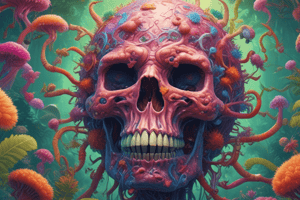Podcast
Questions and Answers
What significant accomplishment is Claudius Galenus credited with?
What significant accomplishment is Claudius Galenus credited with?
- Discovered the circulation of blood
- Differentiated between veins and arteries (correct)
- Performed the first human dissection
- First to describe psychiatric disorders
How did Andreas Vesalius correct Galen's claims?
How did Andreas Vesalius correct Galen's claims?
- By supporting Galen's theories on the heart
- By correctly defining the anatomy of the human skull (correct)
- By disproving the existence of cranial nerves
- By providing a detailed comparison of human and animal anatomy
What is the title of Galenus's published medical book?
What is the title of Galenus's published medical book?
- Medical Anatomy: An Overview
- The Canon of Medicine (correct)
- De Humani Corporis Fabrica
- Anatomical Corpus
Which physiological function did Galenus demonstrate by tying off the ureters?
Which physiological function did Galenus demonstrate by tying off the ureters?
Which of the following anatomical features did Vesalius primarily focus on?
Which of the following anatomical features did Vesalius primarily focus on?
What did Claudius Galenus first correctly describe related to cardiovascular physiology?
What did Claudius Galenus first correctly describe related to cardiovascular physiology?
What cultural background does Ibn Sina, a philosopher-scientist, belong to?
What cultural background does Ibn Sina, a philosopher-scientist, belong to?
Which scientist is known for developing the theory of zoonotic diseases?
Which scientist is known for developing the theory of zoonotic diseases?
What scientific naming system did Carolus Linnaeus create?
What scientific naming system did Carolus Linnaeus create?
Which of the following books was published by Charles Darwin?
Which of the following books was published by Charles Darwin?
What is the primary focus of Darwin's theory of evolution?
What is the primary focus of Darwin's theory of evolution?
Who co-founded the evolutionary theory by natural selection alongside Charles Darwin?
Who co-founded the evolutionary theory by natural selection alongside Charles Darwin?
What is the scientific name for the blue crab?
What is the scientific name for the blue crab?
What process did Louis Pasteur originate that is crucial for food safety?
What process did Louis Pasteur originate that is crucial for food safety?
Which animal was a focus of Alfred Russel Wallace's explorations?
Which animal was a focus of Alfred Russel Wallace's explorations?
What is the correct number of segments the human breastbone is divided into?
What is the correct number of segments the human breastbone is divided into?
Which bone is considered the longest in the human body?
Which bone is considered the longest in the human body?
Which publication is associated with Andreas Vesalius?
Which publication is associated with Andreas Vesalius?
Who first used the term 'cell' to describe microscopic structures?
Who first used the term 'cell' to describe microscopic structures?
What significant discovery is attributed to Anton Van Leeuwenhoek?
What significant discovery is attributed to Anton Van Leeuwenhoek?
Which device is NOT credited to Robert Hooke?
Which device is NOT credited to Robert Hooke?
What does the term 'animalcules' refer to in Van Leeuwenhoek's research?
What does the term 'animalcules' refer to in Van Leeuwenhoek's research?
Which of the following discoveries relates to crystal structures?
Which of the following discoveries relates to crystal structures?
Flashcards are hidden until you start studying
Study Notes
Claudius Galenus (130)
- Roman/Greek surgeon, philosopher, and physician.
- Conducted dissections on Barbary apes, pigs, sheep, and goats.
- Identified 7 pairs of cranial nerves and differentiated heart valves along with structural differences in veins and arteries.
- Demonstrated arteries carry blood, not air; established the brain's control over voice via the recurrent laryngeal nerves.
- Contributions include the first description of carotid sinus hypersensitivity and various psychiatric disorders.
- Author of "The Canon of Medicine" (Al-Qanun fi al-tibb) and "Book of the Cure" (Kitab al-shifa).
Andreas Vesalius (1543)
- European anatomist and physician known for his detailed studies of human anatomy through cadaver dissection.
- Corrected Galen's anatomical errors, including the structure of the human breastbone and the relative lengths of the upper arm and leg bones.
- Produced anatomical charts for the blood and nervous system.
- Published "The Seven Books on the Structure of the Human Body" (De Humani Corporis Fabrica).
Robert Hooke (1665)
- English physicist credited with introducing the term "cell" based on microscopic observations of cork.
- Known for his illustrations of snowflake crystal structures.
- Developed the Gregorian reflecting telescope and the modern microscope.
- Authored "Small Drawings" (Micrographia).
Anton Van Leeuwenhoek (1675)
- Dutch microscopist who discovered bacteria and described 'animalcules' from various sources.
- First to observe protozoa and spermatozoa from multiple organisms.
- Emphasized his pursuit of knowledge and documented remarkable discoveries in his letters.
Carolus Linnaeus (1700)
- Swedish naturalist and explorer who systematized the classification of plants and animals, as well as minerals.
- Introduced binomial nomenclature, a two-part naming system for organisms.
- Notable examples: Tyrannosaurus rex (dinosaur) and Homo sapiens (species).
- Published "Systema Naturae."
Louis Pasteur (1854)
- French chemist and microbiologist who discovered that microorganisms cause fermentation.
- Developed the germ theory of diseases and the concept of zoonotic diseases.
- Originated pasteurization and created vaccines for anthrax and rabies.
Alfred Russel Wallace (1858)
- English humanist and naturalist, co-founder of the theory of evolution by natural selection.
- Explored regions such as Sulawesi, studying the concept of survival of the fittest.
- Authored "The Malay Archipelago."
Charles Darwin (1859)
- English naturalist recognized for his foundational work on evolution via natural selection.
- Proposed that species are more likely to survive by adapting to their environment and passing genes to offspring.
- Published "On the Origin of the Species," detailing his theory of evolution.
Studying That Suits You
Use AI to generate personalized quizzes and flashcards to suit your learning preferences.



